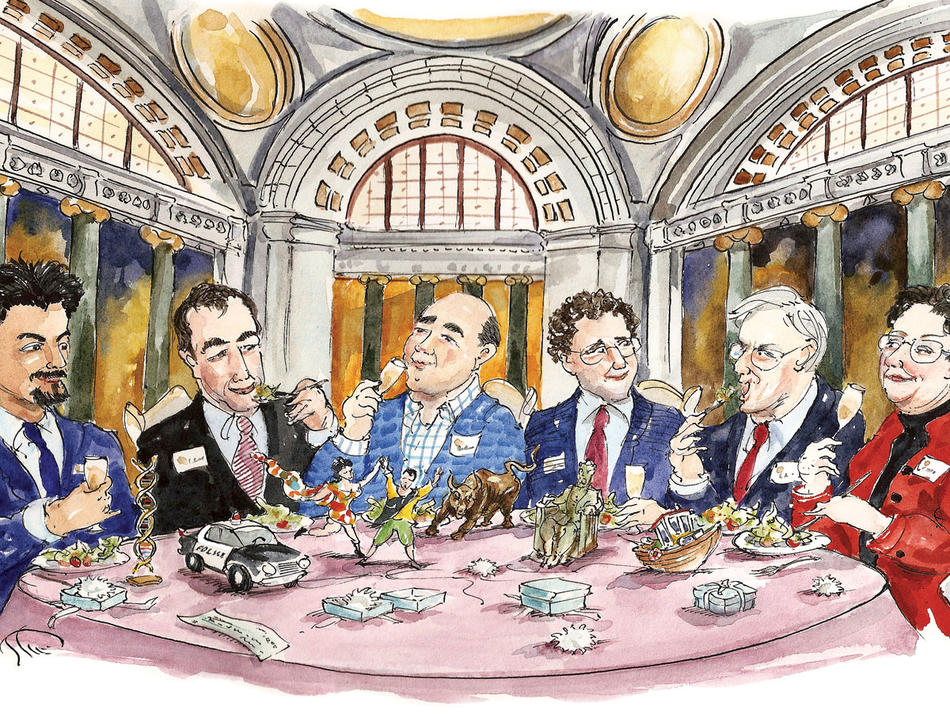It’s the classiest award in America,” said Doonesbury creator Garry Trudeau after he won the 1975 Pulitzer Prize for Editorial Cartooning. “No dinner, no acceptance speeches, no TV show. They just call you up and say, ‘Good going, the check is in the mail.’”
The Pulitzer Prizes, awarded annually by the Graduate School of Journalism, are the pinnacle of achievement in American reporting, letters, and music. But for most of their 94-year history, they were not known for pomp and circumstance — or for flaxseed-encrusted salmon.
Then, in 1984, the Pulitzer Board decided it would be more fitting to honor the recipients at an awards luncheon. Ever since, the winners have received their formal citations, as well as their $10,000 checks, over salad and chardonnay.
So it was that on May 24, in the Faculty Room of Low Memorial Library, more than 200 guests gathered to clink glasses and chat. This year, six of the winners were Columbia alumni or professors, or both — almost certainly a record.
Among the celebrants was Assistant Professor of Medicine Siddhartha Mukherjee, who won for general nonfiction with The Emperor of All Maladies: A Biography of Cancer. When the winners were announced on April 18, Mukherjee was in a bookstore. “Oddly enough,” he said, holding a glass of white wine, “I was buying Kay Ryan’s book.” That book was The Best of It: New and Selected Poems, this year’s winner in the poetry category.
Zhou Long ’93GSAS also was caught off-guard. He became the first Asian American to win the prize for music, with Madame White Snake, an opera that draws on a Chinese folk tale while combining Eastern and Western musical traditions. When a friend called to congratulate him, he hadn’t yet heard the news and was skeptical. “I said, ‘Let’s check the Internet,’” he recalled. “I thought maybe I was a finalist. But my friend said, ‘No, you won!’”
As the crowd proceeded into Low Rotunda for the lunch proper, each of the 31 winners carried a light-blue Tiffany gift box. Inside was a commemorative piece of crystal bearing the recipient’s name and category, and a likeness of Joseph Pulitzer.
Then there were the nonmaterial perks. “A Pulitzer Prize comes with naming rights,” said Pulitzer Board co-chair Kathleen Carroll, executive editor and senior vice president of the Associated Press. “From this day forward you will no longer be Joe Smith and Jane Brown. You will be Pulitzer Prize winner Joe Smith and the Pulitzer Prize–winning Jane Brown.”
On that count, Jeff Gottlieb ’80JRN stood slightly apart. With Ruben Vives, Gottlieb had led a team of Los Angeles Times reporters in investigating how officials in the California town of Bell raided the treasury to pay themselves exorbitant salaries. Los Angeles County District Attorney Steve Cooley called the malfeasances “corruption on steroids.” Their reporting won the prize in public service, which is always given to a news organization. So technically, the winner was the Times.
Gottlieb wasn’t too concerned with the distinction. Like the other winners, he wore a name tag adorned with a Pulitzer motif — specifically, a rendering of the gold medal that is the unique award for public service. “Since I went to the J-school, this is particularly special,” Gottlieb said.
Amy Ellis Nutt ’95JRN, a staff writer for the Newark Star-Ledger and an adjunct professor at the J-school, won the feature writing prize for “The Wreck of the Lady Mary,” a harrowing five-part series about the sinking of a commercial fishing boat off the New Jersey coast in March 2009. Only one crew member, Jose Arias, survived. “I’m thinking of him,” Nutt said. “And the six who died.”
In a corner of the rotunda, DeWitt Clinton Professor of History Eric Foner ’63CC, ’69GSAS stood eating a plate of salmon and Swiss chard. Foner had received the history prize for The Fiery Trial: Abraham Lincoln and American Slavery. “Do you know who the last Columbia historian to win was?” he said. “Richard Hofstadter.” Hofstadter ’42GSAS, who was Foner’s mentor, won in 1964 for general nonfiction. “That shows you it’s not an inside job.”
Just then, one of Foner’s former students came up to greet him. It was ProPublica reporter Jesse Eisinger ’92CC, who was sharing the national reporting prize with his colleague Jake Bernstein for exposing how certain Wall Street bankers put their own finances ahead of those of their clients and even their firms, which made the 2008 financial meltdown even worse. Eisinger had taken Foner’s course in the history of Reconstruction.
“You’ve got to understand Reconstruction to understand the country today,” Foner told him, grinning.
Eisinger smiled. “It was a great class. If only I had retained some of it.” He confessed that his undergraduate academic record was not particularly distinguished. “Columbia was happy to see me go, but I hope they’re happier to see me back.”
As the guests dug into their dessert of key lime gâteau, they listened to remarks by Pulitzer Board co-chair Ann Marie Lipinski, curator-designate of the Nieman Foundation for Journalism at Harvard, and Pulitzer Prize administrator Sig Gissler. Lee Bollinger spoke briefly about the Pulitzer luncheon itself. “There’s nothing I do,” he said, “that I enjoy more during the academic year.”
Then, one by one, as the winners in their respective categories were announced, they came forward to receive their certificates and their unmailed checks.



